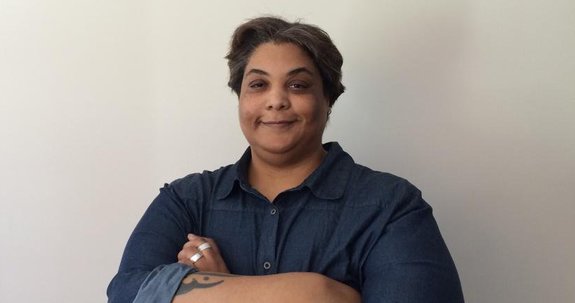
Sitting in the back of the Wisconsin Room in the UW-Milwaukee Student Union, it is October 25th, 2018 and I am doing my very best to fade into the background at tonight’s Distinguished Lecture by Roxane Gay. As the leaders of a campus multicultural sorority introduce both the moderator Dr. Amber Tucker (MKE LGBT+ Community Center) and Dr. Roxane Gay (Purdue University), I continue to feel uncomfortable, never quite certain how I am read by the audience around me. Am I queer enough to belong in this space? Am I enough of a feminist to be here? Such questions of ally-ship and belonging remain at the forefront of my mind throughout the lecture as Roxane Gay reads selected passages from Hunger in order to destabilize the notion of a singular feminism predicated on polite engagement with popular culture. Feminisms need not blend in.
Encouraging the audience to consider embracing rage over forgiveness, Roxane Gay speaks to how political engagement has no obligation to play nice. Toward the end of her talk, and perhaps most strikingly to me as a graduate student facing questions of departmental funding, the future job market, and faculty support, Gay also candidly addresses the precarity of the academic environment. She notes that while she, as a faculty member with tenure, is able to voice deep concern with institutional systems and commitments, not everyone is able to. Just as there is no obligation to be polite, so too is there no obligation to endanger one’s career or one’s wellbeing when situated in precarity. She closes her talk to resounding applause and with a reminder to the audience to empower, not tokenize. I leave the room feeling seen.
—————
Two weeks pass. I fly to Iceland to undertake preliminary dissertation research. I return from the land of ice and fire still ruminating on Gay’s lecture and more specifically on her call to eschew taking on the role of token “X” in the communities in which we work at the white, cisgender, heteronormative institution we call the academy. My brief fieldwork foray, though productive, was a stark reminder that all non-normativities, including my queerness, are easily erased and ignored in particular contexts. Nevertheless optimistic about my own project, on the afternoon of November 7th, 2018 I nestle into my now familiar nook in the fifth row on the right side of Curtin 175 as I try to partition off my excitement about my research progress in order to be present. I fail.
Alongside my somewhat erratic musings on my future year of fieldwork in Iceland, I manage to glean that this is a roundtable on feminist engagements with popular culture hosted by Dr. Elana Levine (JAMS) who is joined by Jessalynn Keller (University of Calgary) and Kristen Warner (University of Alabama). Evidencing the roundtable’s intrigue, the presenters’ opening talks overcome the giddiness of an ethnographer who has just gained access and I am returned to Curtin Hall in Milwaukee. Here, there is a fascinating conversation afoot about the multiplicitous ways in which various feminisms engage with different forms of popular culture. Levine outlines the historical context of feminist engagements with popular culture while Jessalynn regales the audience with tales from teenage feminist Twitter but it is Kristen Warner’s application of de Certeauvian “making do,” that strikes a chord with my recent fieldwork experiences.
Warner reminds the audience that representation of marginalized identities in popular culture matters and that marginalized audiences will “make do” with what exists. Though she discusses the example of women of color and their sketching out of Olivia Pope’s hair routine, I am drawn to think of the “queering” of video game characters such as Link from The Legend of Zelda or the “ship” of Hanzo & McCree in Overwatch. We “make do” with what we have and engage with media to the extent we can. This idea remains with me and I leave the room with a better understanding of my own media practices.
These two talks pushed me to think about my place in the institution that is academia, but more importantly they challenged my self-understanding. It is events such as these, those that invigorate and empower, that I look forward to attending next semester at the Center for 21st Century Studies.